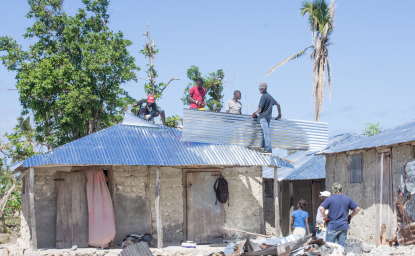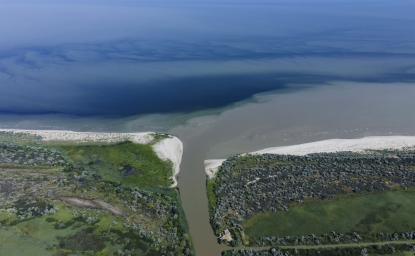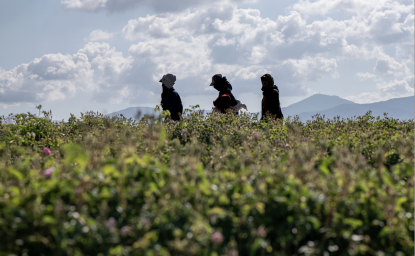Water is an indispensable resource that touches everything—human health and ecosystems; the way people use energy and raw materials and grow food; global climate change; population and economic dynamics; and even potential conflict and political stability. Yet in many parts of the world, this vital resource is increasingly scarce. Population growth, climate change, pollution, industrial development, and government mismanagement are among the factors diminishing the freshwater supply.
As nations grapple with ways to improve water quantity and quality, they also must address potential transboundary disputes. Shared river basins present a dilemma, since different countries have different intended usages for that water: One may want to promote agriculture and fishing; another hydroelectric power; yet another, ecosystem conservation.
While water disputes are common at the local community level, they have not yet prompted nations to go to war. "Water is so important, states can't afford to fight over it," said Geoffrey Dabelko, director of the Wilson Center's Environmental Change & Security Project (ECSP). Instead, water fuels greater interdependence. "Water is strategically important and can be used as a negotiating tool to resolve conflict."
To help generate policy alternatives for the world's water problems, ECSP created Navigating Peace: Forging New Water Partnerships, funded by the Carnegie Corporation of New York. A central component of ECSP's work, this initiative comprises three water working groups that aim to develop cooperative models for shared water resources, emphasize equitable distribution and efficiency, and foster dialogue among the United States, other governments, and civic organizations. To that end, ECSP has coordinated policy papers and conferences in Botswana, Costa Rica, and China.
Conflict and Cooperation
During the past year, the United Nations Foundation (UNF) partnered with ECSP to assemble environmental security experts as part of a larger UN effort to assess global security threats. ECSP submitted two topical papers (on climate change and water) and drafted a summary of June's joint UNF-ECSP roundtable conference. In December, the UN's High-Level Panel on Threats, Challenges, and Change is scheduled to submit its final report to UN Secretary-General Kofi Annan.
The summary emphasized that while water scarcity around the world impedes development and undercuts human health, it has not created wars between states. "Water disputes [between states] do not occur as a result of water scarcity per se but due to sudden, unanticipated changes in water flow," said Dabelko, citing research from Oregon State University's "Basins at Risk" Project.
In its recommendations to the UN, the roundtable advocated a more coordinated, streamlined effort within the UN that prioritizes water issues and underscores water's connection to human security. The experts suggested the UN develop preventive water diplomacy to bolster early-warning systems and improve institutional capacity among nations.
The Okavango: Three Countries, One River
A prime example of the need for cooperation among countries sharing a common water source is the Okavango River basin, the largest inland delta in sub-Saharan Africa and one of the last unindustrialized rivers in the world. The Okavango River originates in Angola, and flows through Namibia to the Kalahari Desert in Botswana. The three countries have different ideas for using the basin's water, making ongoing dialogue crucial to promoting peace and regional integration in Southern Africa.
Angola, which just emerged from a 30-year civil war, aims to develop its economy, an integral part of which would be using the river for industrial development and irrigation. Namibia, one of the region's most arid countries, also wants to use the river for industrial and agricultural purposes and build a freshwater pipeline to increase the urban water supply.
Meanwhile, Botswana—located downstream—registered the delta as a Wetland of International Importance to promote ecotourism and, therefore, has limited residents' rights to hunting, farming, and fishing. Botswana made this move toward conservation, however, without consulting its upstream neighbors.
"On the one hand, water scarcity is limiting the future economic potential of the region," said Anthony Turton, head of the African Water Issues Research Unit at the University of Pretoria. "On the other hand you have a long history of bitter struggle." Turton, a retired senior officer in South Africa's National Intelligence Service, fought in several African wars, including Angola's civil war. He said one would expect a spillover of the political struggle into the struggle over water.
But despite their different objectives, the Okavango's users have not resorted to violence to control the basin's water. Even at the height of political conflicts in the region, water resource managers were negotiating agreements. "In the sea of seething conflict that Southern Africa used to be, we find islands of cooperation around transboundary rivers," Turton told Centerpoint. "Today, a wonderful set of institutions manages transboundary rivers, which are now potentially the foundation of regional integration."
To manage their competing demands over the river basin, the governments of Angola, Namibia, and Botswana formed the Permanent Okavango River Basin Water Commission, known as OKACOM, in 1994. But due to vast distances and lack of funding for travel, OKACOM can only meet annually.
Last year, ECSP, along with Green Cross International and the African Water Issues Research Unit, convened a meeting in the Okavango Delta to discuss the commission's progress and identify challenges facing regional cooperation. National and local government leaders, NGOs, community leaders, and researchers attended this meeting to identify alternatives for successful river basin management.
Ken Conca, a government professor at the University of Maryland who attended the meeting, underscored the importance of communication among governments and civic organizations, and a sustained commitment by the donor community. "International assistance must be multilateral, coordinated, and sustained over time," Conca told Centerpoint. "If not, if all of the aid flows to one country or to one specific need, if lenders rush in and leave, this breeds mistrust."
Dabelko, who also attended the meeting, said, "Their institutions are at an early stage of development, but the governments recognize that cooperation is key and that NGOs are needed in the management of the basin."
Water Conflict Resolution in China
Fast-paced and far-reaching development is straining water resources around the world. In China, the growing water demand coupled with the inefficient use of existing resources has stymied a country doubly cursed: floods beleaguer southern provinces while droughts plague the northern regions.
Domestic water conflicts are increasingly common in China. In response to water scarcity, the Chinese government continues to focus on increasing supply, prompting major dam and water transfer projects. But such projects only temporarily solve the water shortage and often create further conflicts. Meanwhile, in the last 20 years, as industrialization has boomed in China, increasing water pollution among provinces is one of the water-related conflicts that threatens China's rapidly growing economy.
To study these challenges, ECSP's China Environment Forum created a water working group within ECSP's Navigating Peace Initiative to bring together U.S. and Chinese experts who share lessons learned and identify opportunities for cooperation.
ECSP Senior Project Associate Jennifer Turner said, "By debating policy options and building networks on common water conflict problems, the working group hopes to lay the foundation for increased bilateral cooperation on water issues."
While no formal institute or private organization exists in China to provide third-party mediators for environmental disputes, environmental laws in China are becoming more liberal, allowing victims of pollution and natural resource degradation to seek compensation in court. But larger water disputes among villages, cities, and provinces often are resolved by the central government in an ad hoc, case-by-case fashion.
In June 2004, the U.S.-China water working group completed its series of study tour meetings, during which the members met with government agencies, legal experts, NGOs, and researchers who specialize in water conflict and resolution strategies in the United States and China. They currently are completing their comparative research papers, some of which will be published in the Wilson Center's 2005 China Environment Series.
Around the world, sustained efforts—particularly dialogue—among nations are crucial to keeping local clashes over water from escalating into larger conflicts. Civic organizations are key to facilitating such efforts. Properly managing water resources can build confidence and cooperation, and serve as a foundation for peace.
Written by Dana Steinberg, editor, Centerpoint
Related Links




